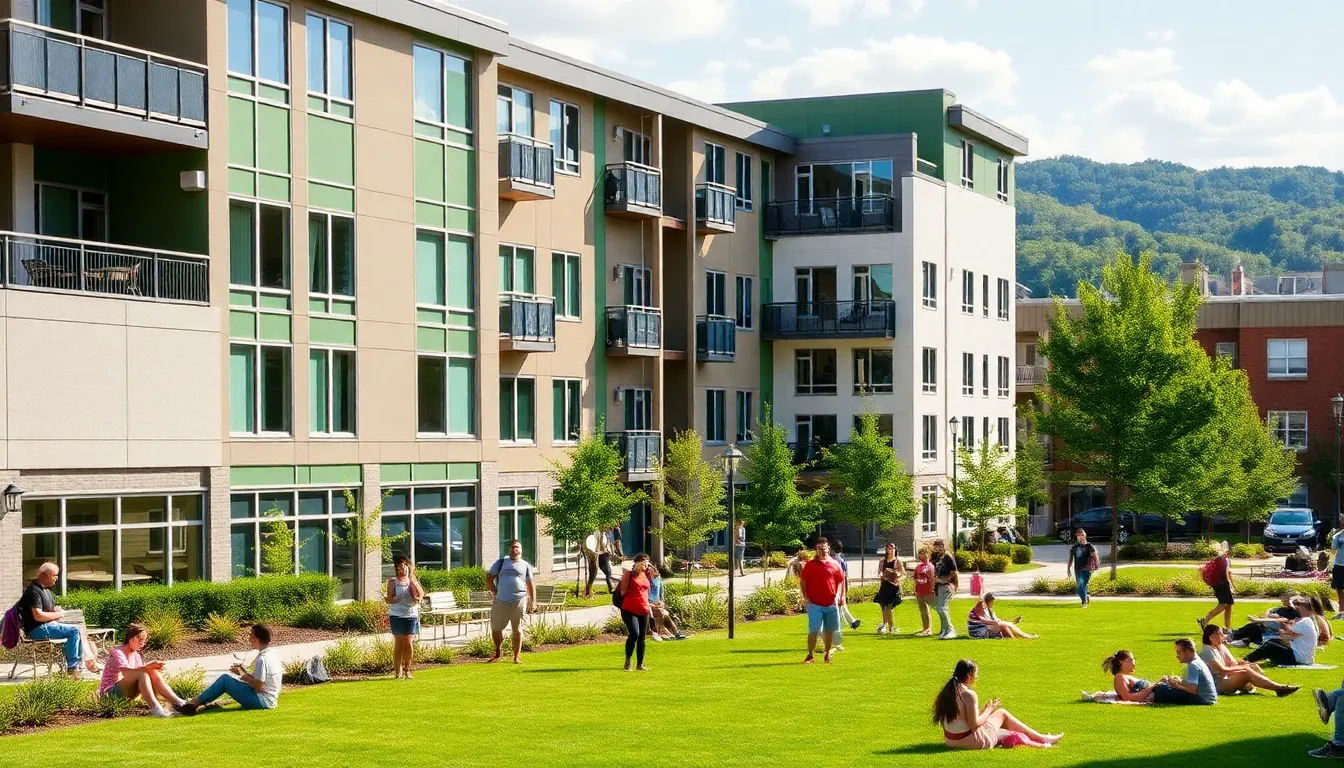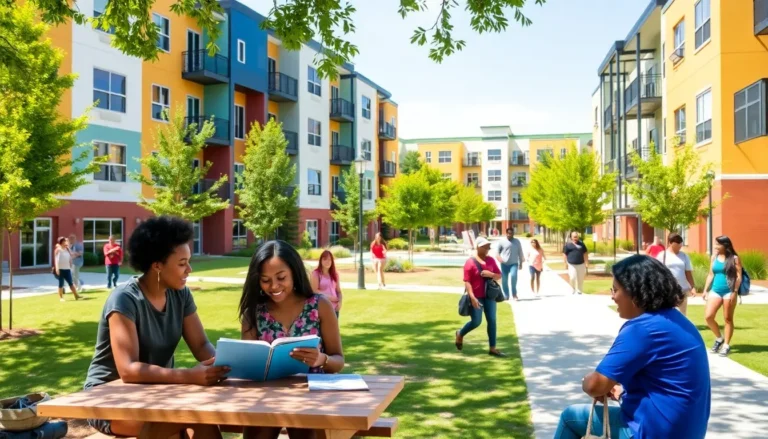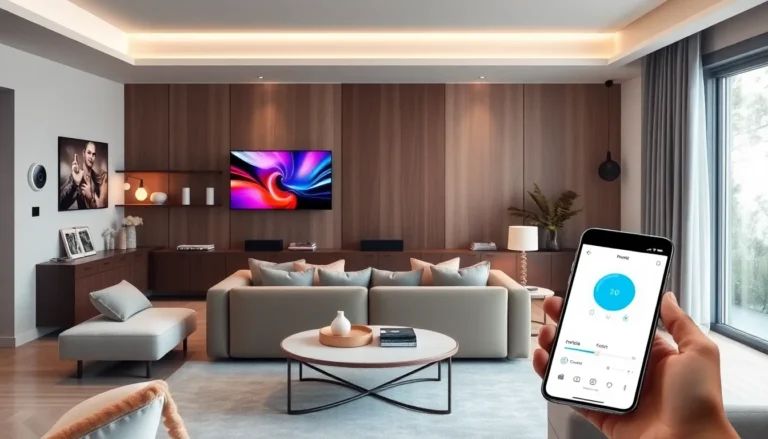Table of Contents
ToggleDeciding where to live while pursuing an education can feel like choosing a flavor of ice cream at a crowded parlor, it’s overwhelming, and everyone seems to have an opinion. When it comes to Norfolk State University housing, students are presented with a smorgasbord of options that cater to different lifestyles and budgets. Whether you’re a meticulous planner or a spontaneous spirit, this guide aims to reveal everything you need to know about housing at NSU, sprinkling in a little humor along the way. So grab a comfy seat, possibly in your future dorm, and let’s dive deep into the world of Norfolk State housing.
Overview of Norfolk State University Housing

Norfolk State University (NSU), located in beautiful Norfolk, Virginia, is known for its commitment to providing quality education and fostering a community spirit. A significant part of that community is its housing facilities, which are designed to create a supportive living and learning environment. NSU offers a variety of housing options, catering to diverse preferences and budgets, from cozy residence halls to more independent living arrangements.
At NSU, the housing system is not just about providing a roof over one’s head: it’s about creating spaces where students can thrive academically and socially. The vibrant mix of cultures and backgrounds among students makes each residence a unique tapestry of experiences. Also, living on campus can provide students with invaluable access to resources, activities, and support services, making transitioning into college life a bit smoother.
Types of Housing Options Available
Norfolk State University provides a variety of housing options to accommodate different needs. Students can choose from traditional residence halls, suite-style accommodations, and even apartments, each offering different amenities and levels of privacy.
Traditional Residence Halls
These halls are often the go-to choice for freshmen eager to jump into campus life. These typically include:
- Shared rooms
- Community bathrooms.
- Common areas for socializing.
Living in a traditional hall fosters camaraderie among students, making late-night study sessions and pancake parties easy.
Suite-Style Housing
Suite-style options provide a bit more privacy. Here, students share a suite with friends while still having their own rooms. This setup usually comes with:
- Shared bathroom facilities
- A living area.
This is ideal for those seeking a balance between social interaction and personal space.
Apartments
For upperclassmen looking for more independence, NSU offers apartment-style living. Each apartment typically includes a kitchen, living area, and private bedrooms. This option allows students to cook their meals and invite friends over without worrying about curfews. It’s a taste of adulting while still enjoying campus life.
Application Process for Housing
Navigating the application process for housing at Norfolk State University is relatively straightforward. Here’s a step-by-step breakdown to ease any logistical worries:
- Complete the Admission Process: Before applying for housing, students must be officially accepted to NSU.
- Submit the Housing Application: This can be done through the university’s housing portal. It’s essential to attend to this early since housing is often allocated on a first-come, first-served basis.
- Pay the Housing Deposit: A non-refundable deposit is typically required to secure your spot. This date can often sneak up on you, so mark your calendars.
- Choose Your Roommates: If students have friends they’d like to share a living space with, they can select their roommates during the application. Don’t let your roommate’s snoring ruin the college experience.
- Await Housing Assignment: After processing, students will receive their housing assignments along with detailed move-in instructions.
This application process ensures that students get their desired living arrangements, keeping their college journey as stress-free as possible.
Living on Campus: Benefits and Amenities
Living on campus at Norfolk State University offers numerous advantages that can greatly enhance a student’s college experience.
Enhanced Academic Performance
Studies have shown that students living on campus tend to have higher GPAs. This could be attributed to easier access to academic resources, study groups, and faculty support.
Social Engagement
Living in a campus residence places students in the heart of social activities. From clubs and events to casual hangouts in the common areas, the chances to make lifelong friends are abundant.
Campus Resources
Residents benefit from amenities such as:
- Fitness centers
- Study lounges
- 24/7 security.
Such resources aim to ensure that students feel safe, supported, and engaged in their educational pursuits.
Off-Campus Housing Alternatives
For students who prefer a different living arrangement, Norfolk has ample off-campus housing options.
Local Apartments
Nearby, students will find various apartment complexes that cater to the student demographic. Many of these places provide amenities such as:
- Furnished rooms
- Study spaces.
Living off-campus can promote independence while still keeping students within reach of the university.
Shared Houses
Some students opt for renting a house with peers. This can be a cost-effective solution and allows for greater camaraderie and personal freedom, perfect for those who enjoy “home”-like settings.
Commuter Housing
For those who live in the surrounding areas, commuting allows students to enjoy the benefits of being a student without the college-priced living expenses. While this option has its perks, it does require more organization and planning to balance commuting with classes and activities.
Tips for Choosing the Right Housing
Selecting the right housing can impact your college experience. Here are a few tips to help guide your decision-making:
Assess Your Needs
Consider factors like budget, distance from campus, and lifestyle preferences. Are you a night owl who revels in the campus environment? Or do you appreciate solitude? Understanding one’s expectations can guide the decision.
Visit Before Deciding
If possible, visiting housing options in person can provide a clearer picture. Pictures can be misleading, so check out the atmospheres. Meet potential roommates, gather their preferences, and assess compatibility.
Plan for the Future
Consider the long-term before signing leases. Flexibility can be vital, especially in uncertain times. Make sure the lease aligns with academic calendars or offers opportunities for renewal.







